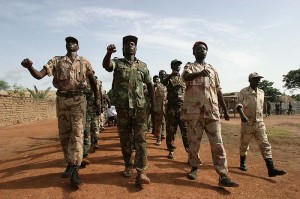Just How Promising is the Peace Process in the Central African Republic?
In a desperate attempt to curb violence perpetuated by Christian and Muslim militias, the Central African Republic (CAR) held a voluntary disarmament drive in Bangui, its capital. Prime Minister Andre Nzapayeke described himself “satisfied” with this result - but should a turnout of 13 bows, 62 arrows, 15 guns and about 200 munitions from less than 200 citizens be considered satisfactory? The situation in the CAR is getting w
orse: according to a recent report from the International Federation for Human Rights, the CAR is now at risk for an all-out genocide. The all too familiar pattern of Christian-Muslim violence in Africa may tempt us to write off the CAR as another failed state. Is there any hope for peace? Looking into its neighbors’ past experiences with religious antagonisms may offer insight into where this fragile nation will go, and what steps can be taken to get it out of this mess.
Until the overthrow of the government in 2013, the CAR’s Muslims and Christians actually coexisted relatively peacefully, despite strings of coups and vicious dictators. In 2013, tensions between President François Bozizé of the CAR, a Christian, and Idris Déby of Chad, a Muslim, resulted in Mr. Déby’s backing of the Séléka rebels in the north. The Séléka is a coalition of Muslim-dominated militias, several of which rebelled against Mr. Bozizé’s government from 2004 to 2007 and signed peace agreements with promises of political integration. The disaffected Séléka accused Bozizé of not adhering to those agreements, and began pillaging towns and killing mostly Christians on its march to the capital - prompting opposition Christian militias to take up arms against the Séléka.
Ultimately, the rebels controlled the government for less than a year before they were forced out of Bangui, leaving innocent Muslim civilians unprotected from the vengeful Christian militias. This deliberate destabilization has since created an artificial divide between Christians and Muslims, allowing for religion to become a rallying point for militants.
The cases of other African countries further reveals that politics, not religion, is often at the root of the issue. Nigeria, a Frankenstein monster of sorts created by British colonial policies, has been ethnically and religiously heterogeneous throughout its post-colonial history. While these divisions did cause tensions, it was corrupt governmental institutions that gave disillusioned Nigerians, especially in the north, a reason to rally around religion to resolve their problems. The anarchic and violent state of Nigeria today is the consequence of years of political incompetence that kept fractionalizing an already divided country.
The Tuareg, an ethnic group made up of tribal nomads in the deserts of northern Mali, has been at odds with the government in the south since Mali’s independence from France in 1960. The cultural and ethnic differences between the two regions were a mismatch to begin with, but the government, dominated by the Bambara, Soninké and Malinké ethnic groups of the south, made matters worse by imposing their culture on the Berber Tuaregs. This led to decades of bloody uprisings. Yet, Islamism only became a major factor during the 1990s, when a few discontented Tuareg tribal leaders began accepting Salafism, an Islamic fundamentalist doctrine, in an attempt to gain more political legitimacy. Further complicating the situation was the growing presence of Islamic terror groups in Mali, including a branch of al-Qaeda, that started working with Salafi Tuaregs. The tangling of these terrorist organizations with the nationalist movement led to the Bamako government mistakenly branding all Tuareg rebels as jihadists and requesting international support to combat the global war on terror.
Not all religiously diverse countries, however, have gone in the same direction. In Senegal, the emergence of a strong national identity has lessened the importance of religious identity, as families are often made up of both Christians and Muslims. In spite of its recent civil war, Sierra Leone is noted as one of the most religiously tolerant countries in the world; many people actually accept both Christianity and Islam and are fittingly referred to as “ChrisMus.” Such religious harmony did not occur by accident; it took governments committed to respecting the personal rights of all of their citizens and encouraging inter-religious dialogue - something that has been lacking in the CAR.
CAR’s current outlook does not look promising. Both the interim government and international forces have done little to disarm the militias and quell their brutal attacks, and if nothing is changed, the Nigerian and Malian situations will seem benign in comparison. As we have seen across Africa, policies that result in “tit for tat” escalation between ethno-religious groups are an alarming indication of irreconcilable conflict.
At its heart, the strife in the CAR is about much more than religion. The inability of Bangui to fairly include the Muslim-dominated north in politics has instigated hostilities. Integrating those areas back into the government will help rebuild the broken religious relations that have been edging towards genocide. A more forceful government would also have to disarm all militias to guarantee equal protection of citizens. Finally, even greater international participation is desperately needed to curb the bloodshed. Although more peacekeepers will be deployed by the UN in September, the international community must play a greater role before then to bring warring parties to the table in order to resolve the conflict peacefully. Small-scale disarmament drives will no longer suffice.

